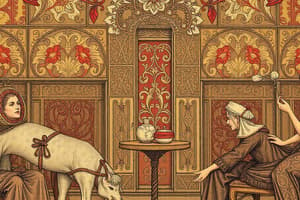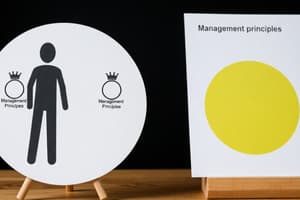Podcast
Questions and Answers
What characterizes a constructive organizational culture?
What characterizes a constructive organizational culture?
- Members avoid collaboration to protect their roles.
- Members are encouraged to work together to meet higher order human needs. (correct)
- Members often act defensively to avoid risks.
- Members compete with one another for resources.
How does workforce diversity relate to organizational culture?
How does workforce diversity relate to organizational culture?
- It fosters respect for individual differences in the workplace. (correct)
- It eliminates the need for inclusivity in the workplace.
- It is irrelevant to the success of modern organizations.
- It can create challenges that lead to conflict among members.
What is the primary focus of a passive/defensive culture?
What is the primary focus of a passive/defensive culture?
- Seeking to protect individual security in working relationships. (correct)
- Promoting aggressive competition among employees.
- Encouraging risk-taking and innovation.
- Fostering open communication and collaboration.
What does multiculturalism primarily emphasize in an organization?
What does multiculturalism primarily emphasize in an organization?
How is inclusivity defined within an organizational culture?
How is inclusivity defined within an organizational culture?
What is the primary focus of Organizational Behavior (OB)?
What is the primary focus of Organizational Behavior (OB)?
Which component is NOT part of the definition of Organizational Behavior?
Which component is NOT part of the definition of Organizational Behavior?
Which of the following best describes organizational culture?
Which of the following best describes organizational culture?
What is one key role of stakeholders in an organization?
What is one key role of stakeholders in an organization?
What encompasses the term 'technology' in an organizational context?
What encompasses the term 'technology' in an organizational context?
Which aspect does the organizational structure NOT include?
Which aspect does the organizational structure NOT include?
What is the core purpose of most organizations?
What is the core purpose of most organizations?
Which characteristic is NOT typically associated with positive organizational cultures?
Which characteristic is NOT typically associated with positive organizational cultures?
Flashcards are hidden until you start studying
Study Notes
Introduction to Organizational Behavior
- Organizational Behavior (OB) studies the interaction between individuals and organizations, exploring both individual and group dynamics.
- Human behavior encompasses visible actions influenced by thoughts, feelings, emotions, and sentiments within and outside organizational settings.
Key Components of Organizational Behavior
- Task: Refers to the organization's mission, purpose, and goals.
- People: Represents the human resources essential for achieving organizational objectives.
- Structure: Defines how work is designed at both micro (departmental) and macro (overall organization) levels.
- Technology: Involves processes used to convert inputs into goods or services, aligning with organizational goals.
Organizational Purpose, Mission, and Strategy
- Core purpose focuses on creating goods and services for customers.
- Mission statements guide members' focus on core objectives.
- A clear sense of purpose and vision drives strategic pursuit for organizational goals.
Organizational Environments and Stakeholders
- Stakeholders include anyone affected by the organization's performance, including customers, owners, employees, suppliers, regulators, and local communities.
Organizational Cultures
- Organizational Culture: Shared beliefs and values that shape behavior within the organization.
- Positive cultures foster high performance, teamwork, risk-taking, and innovation.
- Types of Organizational Culture:
- Constructive Culture: Encourages collaboration to meet higher human needs.
- Passive/Defensive Culture: Members act defensively to protect personal security.
- Aggressive/Defensive Culture: Members act forcefully to safeguard status.
Diversity and Multiculturalism
- Workforce Diversity: Reflects individual differences including gender, race, ethnicity, age, ability, and sexual orientation.
- Positive cultures respect diversity, recognizing its value for organizational success.
- Multiculturalism: Advocates for pluralism and appreciation of individual differences.
- Inclusivity: Measures culture's respect for diversity and openness to all qualified individuals regardless of their attributes.
- Valuing diversity is vital for success in modern business environments.
Studying That Suits You
Use AI to generate personalized quizzes and flashcards to suit your learning preferences.




